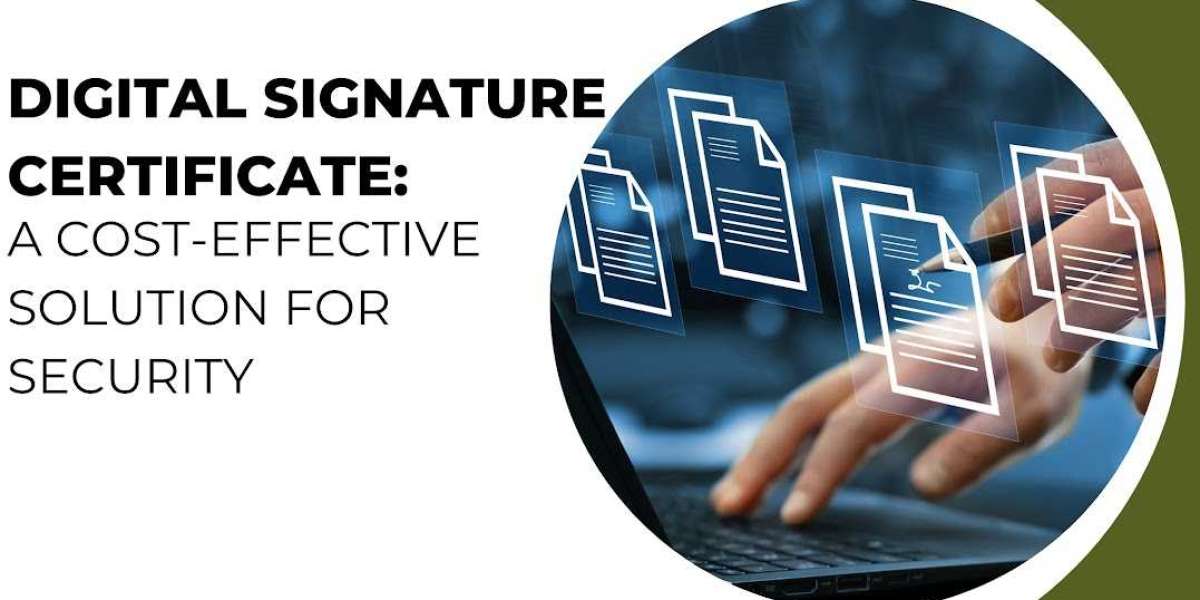In today’s digital age, where information exchange occurs at lightning speed, ensuring the security and integrity of sensitive data is paramount. Digital Signature Certificate (DSC) have emerged as a robust, cost-effective solution for safeguarding online transactions, documents, and communications. This article delves into the role of DSCs as a security tool, their benefits, applications, and why they are an economically viable choice for businesses and individuals alike.
Understanding Digital Signature Certificates
A Digital Signature Certificate is an electronic credential issued by a Certifying Authority (CA) that authenticates the identity of the certificate holder. It serves as a virtual signature, ensuring that electronic communications and transactions are secure, tamper-proof, and legally recognized. DSCs use cryptographic algorithms to generate unique digital signatures, ensuring the authenticity and integrity of the signed data.
There are three key elements to a DSC:
- Authentication: Verifies the identity of the individual or organization.
- Integrity: Ensures that the signed data has not been altered.
- Non-Repudiation: Provides legal proof that the signature belongs to the specified user, making it impossible to deny involvement.
The process to apply for Digital Signature Certificate
Step 1: Access Our Website
Begin by visiting our website to initiate the process.
Step 2: Provide Your Details
- User Type: Select whether you are registering as an individual or an organization.
- Certificate Type: Decide if you require the certificate solely for document signing or both signing and encryption.
- Validity: Specify the desired validity period of the certificate.
- Personal Information: Fill in your name, contact number, email address, and residential address.
- Terms Agreement: Tick the box to acknowledge and agree to the terms and conditions.
- Submission: Click the submit button to proceed.
Step 3: Select Your Token Option
- Already Have a Token?: If you own a USB token, choose "No." If you need to purchase one, select "Yes."
Step 4: Process Payment
- Payment Details: Enter your payment information and select your preferred payment method (net banking, credit card, debit card, or UPI).
Step 5: Finalize the Process
- Review Information: Double-check that all the entered details are accurate.
- Submit: Confirm by clicking the submit button, then wait for a confirmation email.
Step 6: Receive Your Digital Signature
After the process is complete, your digital signature will be delivered on a USB token device.
The Cost-Effectiveness of Digital Signature Certificates
While security solutions can often be expensive, DSCs provide an affordable yet highly effective method for protecting digital interactions. Here are some of the factors that make DSCs a cost-effective choice:
Reduced Paper and Printing Costs:
- Traditional methods of signing documents involve printing, signing, scanning, and mailing. These processes not only consume resources but also incur recurring costs.
- With DSCs, documents can be signed digitally, eliminating the need for physical materials.
Time Savings:
- In a competitive environment, time is money. DSCs streamline workflows by enabling instant signing and verification of documents.
- This efficiency reduces delays, particularly in processes like contract approvals, tax filings, and regulatory submissions.
Elimination of Courier and Storage Costs:
- Physical document delivery requires courier services, which can be expensive, especially for international transactions.
- DSCs facilitate secure electronic document exchange, reducing dependency on courier services and physical storage.
Scalability:
- Businesses of all sizes can adopt DSCs, making them accessible to startups, small businesses, and large corporations alike.
- Economies of scale ensure that as the adoption of DSCs grows, the overall cost per certificate decreases.
Long-Term Investment:
- Unlike traditional security measures that may require frequent upgrades and replacements, DSCs are issued for a specific validity period (e.g., 1-3 years). Renewing them is a straightforward and cost-effective process.
Reduction in Fraud and Legal Costs:
- DSCs provide a high level of security, reducing the risk of forgery, fraud, and unauthorized access.
- By ensuring non-repudiation, DSCs help organizations avoid costly legal disputes.
Applications of Digital Signature Certificates
DSCs are versatile and find applications across various domains, making them an indispensable tool in today’s digital landscape:
Tax Filings:
- Governments worldwide mandate the use of DSCs for filing income tax returns, GST returns, and other statutory documents. They ensure secure and authenticated submissions.
E-Tendering:
- Public and private sector entities use DSCs for participating in online tenders, ensuring the confidentiality and authenticity of bids.
Banking and Financial Services:
- DSCs are used for secure online banking transactions, loan applications, and other financial processes.
- They help establish trust between financial institutions and customers.
Corporate Governance:
- Companies use DSCs for signing board resolutions, financial statements, and other critical documents.
- They ensure compliance with regulatory frameworks and enhance transparency.
Legal Documentation:
- Lawyers and legal professionals utilize DSCs to sign contracts, affidavits, and other legal documents, ensuring their validity and integrity.
Security Features of Digital Signature Certificates
DSCs incorporate advanced security mechanisms, making them one of the most reliable tools for digital authentication. Key features include:
Encryption:
- DSCs use public and private key pairs to encrypt and decrypt data, ensuring that sensitive information remains secure during transmission.
Tamper Detection:
- If a digitally signed document is altered in any way, the signature becomes invalid, alerting users to potential tampering.
User Authentication:
- Only authorized users with access to the private key can generate a valid digital signature, minimizing the risk of impersonation.
Secure Key Storage:
- Private keys are stored securely on devices like USB tokens or smart cards, adding an extra layer of protection against unauthorized access.
Compliance with Standards:
- DSCs adhere to international security standards and legal frameworks, ensuring their validity and acceptance across borders.
The Future of Digital Signature Certificates
As digital transformation accelerates, the adoption of DSCs is expected to grow exponentially. Emerging trends include:
Blockchain Integration:
- Blockchain technology is enhancing the transparency and immutability of DSCs, making them even more secure.
AI-Powered Verification:
- Artificial Intelligence is being used to improve the accuracy and speed of DSC verification processes.
Global Acceptance:
- As international trade and digital diplomacy expand, the need for globally recognized DSCs will increase.
Biometric Enhancements:
- Future DSCs may incorporate biometric data for an additional layer of security.
Also, read-Class 3 digital signature through the Digital Signature.
Conclusion
Digital Signature Certificates are a game-changing solution for securing digital interactions. They offer a cost-effective, reliable, and scalable method for ensuring the authenticity, integrity, and non-repudiation of electronic documents and transactions. As the world moves towards a more interconnected and paperless future, DSCs will undoubtedly play a pivotal role in shaping secure and efficient digital ecosystems.



